FOCUS
ON BIDZINA'S DREAM

The Roots and Consequences of Stalin’s Glorification in Georgia Ukraine Latest: Ukraine Scores Massive Weapons Boost From NATO Conspiracy- Georgia’s Style of Action Energy Efficiency – What It Is and Why You Should Be Doing It




PreparedforGeorgiaTodayBusinessby Issue no: 1448 • • MAY 3 - 9, 2024 • • PUBLISHED WEEKLY In
issue... PRICE: GEL 2.50
POLITICS PAGE
POLITICS PAGE
NEWS PAGE
CULTURE PAGE 11 SPORTS PAGE 11 BUSINESS PAGE 8 SOCIETY PAGE 9 Continued on page 3
this week’s
American Friends of Georgia Celebrates 30 Years of Charity Work and Friendship with Annual Gala Bakuriani 2024 Archery Championship: Empowering Communities Through Sport From Idea to Impact: The Journey of Connect and Healzcare.org
4
5
2
NDI head Luis Navarro
Georgia's latest political drama and predicts what's in store at the elections PAGE 7
Former
analyses
BY TEAM GT
Ivanishvili during his April 29 speech. Source: FB
he Georgia Today newspaper is going to print this Easter weekend with ongoing nightly protests gripping the capital city, as they have done for the past three weeks.
large part of Georgia’s society – that +80% that aspires to the country’s European and NATO aspirations – have spent the good part of a month in protest at the ruling party’s proposed “On transparency of foreign influence" bill (on the streets known as the “Russian Law” or “Foreign Agents’ Bill”). Many have stood in front of the parliament building in peaceful protest – students, children and the elderly- singing, chanting, recording videos to share on social media, and waving European and Georgian flags. Anger has often been stirred by the presence of special police forces, whom the more emotional of the protesters have attacked with bottles or words, or by damaging property to create barricades. In return, they have been arrested or sprayed with pepper spray.
Source: cepa
A
Parliament Adopts Foreign Agents’ Draft Law on 2nd Reading, Street Protests Continue
Ukraine Latest: Ukraine Scores Massive Weapons Boost From NATO
COMPILED BY ANA DUMBADZE
At least three people were killed and three injured after a Russian missile struck the Ukrainian port city of Odesa early on Wednesday, while one woman was killed and three people injured in Ukrainian shelling along the border in Russia’s Kursk region, according to the regional governor there.
At least one man was killed and nine injured in the northeastern city of Kharkiv after Russia struck a railway line with a guided bomb damaging nearby residential buildings in the latest attack on Ukraine’s second-biggest city. Ukraine’s railway company said the 24-year-old victim was one of its employees.
Moscow has accused Ukraine of attacking Crimea, which Russia invaded and annexed from Ukraine in 2014, using Army Tactical Missile Systems (ATACMS). The Russian Ministry of Defense said six of the missiles were shot down, along with 10 drones and two guided bombs. It did not say where the weapons were brought down or whether there was any damage. Ukraine did not comment.
The spokesman for Ukraine’s border service told the Ukrinform news agency that about 30 Ukrainian men had died trying to cross Ukraine’s borders illegally in an attempt to avoid fighting in the war since Russia launched its full-scale invasion of Ukraine in February 2022. Under Ukrainian law, men between the ages of 18 and 60 are not allowed to leave the country as they may be mobilized to fight.
Ukrainian soldiers discovered Lidya Stepanovna, a 97-year-old Ukrainian woman, who said she had walked 10km (6 miles) under shelling to escape Ocheretyne in Donetsk, now occupied by Russia, and reach areas controlled by Kyiv.

is now in a shelter for evacuees.
UKRAINE SCORES MASSIVE WEAPONS BOOST FROM NATO NATION
Ukrainian President Volodymyr Zelensky said Ukraine needed “a significant acceleration” in deliveries of weaponry from its partners, particularly the United States, to enable its troops to face advancing Russian forces along several sectors of the front line. Top Ukrainian commander Oleksandr Syrskii has said the Russians are intent on seizing the town of Chasiv Yar to coincide with the commemoration on May 9 of the Soviet victory in World War II.

New 9km Section of East-West
Highway
at Zestaponi Opened
TShorapani-Argveta section has been opened to traffic. According to the Ministry of Regional Development and Infrastructure of Georgia, vehicles traveling on the East-West International Highway
(E60) will no longer have to enter the city of Zestaponi and will instead be able to use the new Zestaponi bypass. The Zestaponi bypass, like all sections of the highway, will significantly increase the standard of road safety and ensure more comfortable and smooth movement.
US Secretary of Defense Lloyd Austin said Washington had been encouraging countries with Patriot missile systems to donate them to Ukraine. He did not name the countries, but Spain, Greece, Germany, the Netherlands, Poland and Sweden are among the European nations that have Patriots.
Ukraine has scored a massive weapons boost from NATO member Germany as part of a fresh tranche of military aid unveiled on Monday.
"Great news from our German friends! Thank you for your steadfast support!" Ukraine's Defense Ministry said on social media, announcing that Kyiv's military will receive more armored personnel carriers, anti-aircraft defenses, and
ammunition for its ongoing fight against Russia.
Russian forces have advanced in parts of Ukraine's eastern Donbas region in recent months as Ukraine suffers shortages of ammunition and equipment.
Ukrainian President Volodymyr Zelensky has been appealing to his Western allies to provide additional support, saying that his troops are being hindered by low supplies of shells.
As part of its latest military aid package, Germany has provided another 10 "Marder" armored personnel carriers, a second Skynex anti-aircraft system, nearly 30,000 rounds of ammunition for the "Gepard" anti-aircraft gun, ammunition for the Leopard 2 tank, missiles for the
Iris-T system, and other supplies. The development comes days after German Chancellor Olaf Scholz said that Ukraine's allies in Europe must continue to provide assistance following a recent $61-billion aid package approved by Washington after months of talks. Scholz on April 24 described the U.S. military aid package as "an encouraging and necessary signal."
VLADIMIR PUTIN PARADES CAPTURED US TANKS AND BRITISH ARMORED VEHICLES FROM UKRAINE WAR
An exhibition of Western military equipment captured from Kyiv forces during the fighting in Ukraine opened Wednesday in the Russian capital, Moscow.
The exhibit organized by the Russian Defense Ministry features more than 30 pieces of Western-made heavy equipment, including a U.S.-made M1 Abrams battle tank and a Bradley armored fighting vehicle, a Leopard 2 tank, a Marder armored infantry vehicle from Germany, and a French-made AMX-10RC armored vehicle.
The exhibition, which will remain open for a month at a World War II memorial venue in western Moscow, also displays firearms, military papers and other documents.
Russian authorities have criticized supplies of Western weapons and military equipment to Ukraine, casting them as evidence of NATO’s direct involvement in the fighting. At the same time, Russian President Vladimir Putin has repeatedly declared that Western military supplies to Kyiv wouldn’t change the course of the conflict or prevent Russia from achieving its goals.
The exhibition comes as Russian forces have grabbed more land in eastern Ukraine, taking advantage of delays in US military assistance to push back the under-gunned Kyiv forces. Putin’s spokesman, Dmitry Peskov, has hailed the Moscow exhibition as a “brilliant idea.”
Statement by the Secretary General on the Situation in Georgia
Council of Europe Secretary General Marija Pejcinovic Buric on Thursday made the following statement:
“I am deeply concerned by the developments unfolding in Georgia and regret Parliament’s adoption in second reading of the draft law ‘on transparency of foreign influence’, despite calls by Georgia’s international partners to withdraw it. Given the major concerns about its compatibility with European democratic and human rights standards, I call on Georgian lawmakers to wait for
the forthcoming opinion of the Venice Commission and to consider its recommendations before making any final decisions.
“An enabling environment for civil society and the media is essential for a vibrant and fully functioning democracy.
Transparency should not be used as an instrument to stigmatise civil society organisations and limit their capacity to operate freely.
“I also condemn the violence witnessed on the streets of Tbilisi over recent days. Disproportionate use of force against
demonstrators is incompatible with human rights standards. Georgians, who have demonstrated their profound attachment to democracy on many occasions, should be able to exercise their freedoms of assembly and expression in a peaceful manner.
“I hope that Georgia and the Council of Europe continue the constructive dialogue that has characterized our productive cooperation over recent years. We remain ready to assist Georgia in ensuring compliance with international standards on its paths towards EU integration.”

GEORGIA TODAY MAY 3 9, 2024 2 NEWS
Image: Ukraine. Photo by Ascha Schuermann/Getty Images
Stepanovna
he
Zestaponi bypass highway on the
9-km-long
Parliament Adopts Foreign Agents’ Draft Law on 2nd Reading, Street Protests Continue
Several times the crowds have been pushed back with water cannons and tear gas, leading many protesters to invest in masks and goggles so as to be able to hold the line. Ambulances are on scene each night to help the injured, and there is a sense of unity among the crowds, who readily help each other and welcome others to join their ranks – on Wednesday, the rally was joined by Gurians and a large group from Batumi, among others, who came by car and public transport to raise their own voices against the government’s new bill.
In contrast, the ruling Georgian Dream party on April 29 bussed in its own supporters from the country’s regional civil servant pool, openly threatening that their jobs would be on the line should they not participate. Those interviewed by TV journalists seemed uncertain as to why they were going to Tbilisi, or the meaning of the “Russian Law” for Georgia. Those who were better versed in the political situation hid their faces from the cameras and claimed to be on the buses for touristic reasons. The crowds at the Georgian Dream rally were less energetic, mostly middle-aged or elderly, and waved Georgian and Georgian Dream flags – not a European flag and barely a mobile phone to be seen. Many rushed back to their buses as soon as the speeches were done. Far from the celebration of unity and camaraderie seen at the anti-Russian Law protests every other night.
Yet it seems Georgian Dream, and particularly its head Bidzina Ivanishvili, are deaf to the calls of the Georgian people to withdraw the bill and the warnings of the country’s international partners
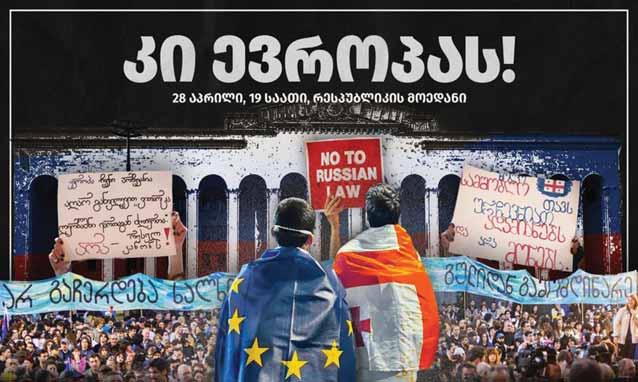
that this will affect Georgia’s EU membership chances. During Wednesday’s voting held at the plenary session following the second reading of the draft law “On transparency of foreign influence," 83 deputies supported the project, and 23 members of the parliament opposed it.
The draft law provides for the registration of non-entrepreneurial (non-commercial) legal entities and media outlets as organizations carrying out the interests of a foreign power, if certain volume of their income - more than 20% - is
received from abroad.
Based on the draft law, everyone who is considered to be an "organization carrying the interests of a foreign power" must be registered in the public register under the same name. At the time of registration, it will be necessary to reflect the received income. Refusal to register and report income, or provision of incorrect information, will result in hefty fines.
63 people were arrested at the rally held Tuesday night on Rustaveli Avenue, Deputy Minister of Internal Affairs, Aleksandre Darakhvelidze, announced
Wednesday morning.
"The employees of the Ministry of Internal Affairs arrested 63 people under Articles 166 and 173 for petty hooliganism and disobedience to the legal demands of the police at the rally on Rustaveli Avenue," he said.
"I would like to emphasize that the organizers and participants of the rally had the opportunity to express their protest in a peaceful situation throughout the day, however, after the plenary session came to an end, the participants blocked the exits of the parliament build-
ing and said that they would not allow members of parliament to leave,” Darakhvelidze noted.
"In accordance with the Law of Georgia 'On Assemblies and Manifestations,' it is forbidden to block the entrances of administrative buildings and disrupt their activities. Despite numerous calls made by the police, as well as the statements issued by the Ministry of Internal Affairs, not to block the administrative building and to continue protesting within the limits established by law, the organizers of the rally did not obey the instructions of the law enforcement officers and continued to intentionally block the entrances. Taking into account the situation, the police secured the parliament building exit and placed a police cordon on the site so that members of the parliament and employees had the opportunity to move safely.”
In each protest, the majority of protesters keep the peace, and repeatedly ask those at the front line to keep calm and refrain from provoking the police. It is clear, however, that the police are choosing to use inappropriate force against the rally-goers by beating them, employing water jets, and shooting tear gas. Various types of injuries have been reported, including wounds to the face, head and different parts of the body, as well as respiratory tract complications. Despite the growing realization that Ivanishvili’s party seems determined to pass the new law, the protesters show no signs of fear or a desire to stop their protests; night after night uniting in front of the parliament building, cheering, singing, and humming the European Anthem; the air bitter with tear gas, but the desire for victory beating strong in their hearts.

GEORGIA TODAY MAY 3 9, 2024 3 NEWS
at a briefing
Continued from page 1
Russian law surati: Source: FB
The Roots and Consequences of Stalin’s Glorification in Georgia
INTERVIEW BY TATJANA MONTIK
Giorgi Kandelaki, 41, is a historian, a former politician of the United National Movement and European Georgia, a member of the Soviet Past Research Laboratory (SovLab), and the editor of the book ‘Georgia against Stalin,’ written by Lasha Bughadze in collaboration with SovLab and leading scientific editor Irakli Khvadagiani.
‘Georgia against Stalin’ is a non-fiction book based on extensive archive research into popular history, and boasts numerous footnotes and references. It is based on many documents which have never been published and which are largely unknown to Western scholars.
We asked Giorgi Kandelaki to tell us more.
WHY HAS THE FIGURE OF STALIN BECOME SO IMPORTANT FOR GEORGIA AGAIN?
The Russian disinformation warfare machine has weaponized the memories of the Soviet Union massively, not only in Georgia. Their investment has been long-term, systematic, and disciplined.
In Georgia, the focus on the figure of Joseph Stalin is a central theme of this long-term effort. The Russian long-term warfare in Georgia is focused on cultivating anti-western, nativist, ethno-religious nationalism, in which Western civilization is a threat, a danger to our souls. It claims salvation can only be found in the Russian world.
This project “Stalin” is like an umbrella that brings all projects within a consistent set of values. In it, he serves as a flagship of this nationalism and is a matter of Georgian national pride. It is very important to understand that this is tailored specifically to Georgia, and it also illustrates how long-term and serious the Russian effort has been.
The narrative they push is very simple and almost genius: “A small-town boy who made it so big; our guy, who ruled over them, who had so much power, shouldn`t we be proud? Shouldn’t it be a matter of Georgian national pride?”
WHO WOULD BELIEVE THIS IN THE 20TH CENTURY?
Unfortunately, Georgian society has a certain amnesia with regards the 20th century. They utilize the fact that Georgia hasn’t really settled with the Soviet Union, with what the Soviet Union did to Georgian society, and in particular what Joseph Stalin did.
WHY HASN´T THIS EVALUATION HAPPENED?
It hasn’t happened for several reasons. The first is that the basis for this national pride linked with Stalin existed before the classical propaganda exercise began; it is based on something which already existed, and which was then amplified. In 1956, when de-Stalinisation started, the society that was already scared from 30 years of totalitarianism and was brainwashed, misunderstood de-Stalinisation as a move against Georgians. In the 1980s, the liberation movement side-stepped Stalin and focused entirely on Orjonikidze and Lenin, but not on Stalin.
WHAT ABOUT THE POSTSOVIET AGENDA? WHAT WAS MISSING THERE?
The mistake of the Rose Revolution, even though it was a very anti-Soviet phenomenon, and saw steps undertaken to deal with the Soviet past, was that people thought the chapter on the Soviet Union had ended with the Rose Revolution. And while the nucleus of civil society focused on the long-term path, our Soviet past was outside our bubble. Even when

it became clear it was a big deal and a serious problem, still the Western and American agenda of fighting Russian disinformation focused on fact-checking and not on memory. Yet memory is an existential issue. On the Western side, conferences and complicated PowerPoint presentations produce things that don’t impact the broader masses, while the other side works precisely though memory, because memory does impact the broader masses. Everybody knows Stalin. Stalin is an image which everybody recognizes in Georgia. And we have dealt with this in a comprehensive way. Even people who know about his crimes don’t know what he did to Georgia, specifically to Georgia.
AND THIS IS THE TOPIC OF THE BOOK ‘GEORGIA AGAINST STALIN’?
Exactly! These things have never been told in a Georgian context. Stalin is one of the most researched political figures; there are so many works about him, and Georgia is featured in many of these works, studies, articles and books - but only as a place where he was born, robbed a bank, and left.
But the conflict about Stalin and Georgia, what this book is about, is the fundamental existential clash of Stalin and the project of modernized and democratic Georgia, a project which started in the 1860s and culminated with the First Republic in 1918. The project of “Western” Georgia.
Stalin entered to clash with this project from very early on. He left in 1907, defeated. Indeed, the story of Stalin and Georgia is a story of perpetual defeat. He suffered many defeats here. The Bolsheviks were marginal here, the majority were social democrats. Stalin left Georgia because he lost, and he had a complex about it which continued when he came to power in Bolshevik Russia. This complex became his main story, and he was obsessed with the destruction of independent Georgia.
THIS IS TRULY A TOPIC WHICH NOT EVERYONE WOULD KNOW.
Yes. Because this story has never been told! Stalin pushed for the invasion of the Democratic Republic of Georgia. We tell this story [in the book], and explain what it was that he destroyed: Georgia`s democratic institutions, local elections, rule of law, jury trials, decentralized police, and international recognition!
Alongside the Baltic states, Finland and Poland, Georgia also got international recognition in January 1921. Georgian
Ambassador Akaki Chkhenkeli was in Paris to present his credentials to the French president on the day the Red Army entered Tbilisi. We show the Georgian-Russian war of 1921, the Red Army in Tbilisi. Georgia did not join the Soviet Union voluntarily; it was imposed on Georgian society through war. The Baltic states surrendered in 1940, and later engaged in a massive guerrilla warfare. Georgia did not surrender: It fought for one month alone against Russia, with the French navy participating in the war in Abkhazia. The French navy managed to arrive in Abkhazia, and the Georgians took Gagra by counterattack, even after Tbilisi had fallen. It was a big war with many casualties. It is not only that Georgia did not become part of the Soviet Union voluntarily, but that Georgia was an internationally recognized country that was destroyed as a result of this invasion, an invasion driven by Stalin. This story has never been told. That is how we want to deal with the weaponization of Stalin’s figure. This book is written from a Georgian patriotic perspective.
I HOPE YOU WILL BE ABLE TO SELL IT IN GEORGIA.
It is already a bestseller. We have already sold two editions. One edition is around 1,000 copies, which, for Georgia, for a printed book, is quite good. We also produce a lot of audiovisual materials for social media. And we market the book that way as well.
HOW DO YOU EXPLAIN THE FACT THAT IN A COUNTRY WHICH IS AIMING TO JOIN THE EUROPEAN UNION, THERE IS A MUSEUM WHICH GLORIFIES THE STALINIST PAST?
I was involved in transforming the Stalin Museum in Gori into the Museum of Stalinism, a project launched in 2012. It was to be an equivalent to the Holocaust Museum, and would tell the story of the Stalinist crimes, and not only in Georgia. It was a very serious formidable project, but the Georgian Dream government stopped it in 2013. Last year, we had a scandal with the Polish ambassador, who commented publicly, when the war in Ukraine started: “At least close this museum!” And he had a conflict with the Georgian Ministry of Foreign Affairs. Sadly, Georgia’s most popular museum glorifies Joseph Stalin, which is the same as imagining Germany’s most popular museum glorifying Adolf Hitler. There is no difference! And your question is right: If the country wants to be a part of the EU, how is that possible?
IS THE SOVIET PAST A HEAVY WEIGHT LYING HIDDEN IN THE STORES OF GEORGIAN HISTORY?
Our society has not dealt with this story. It is a hidden story: Stalin`s legacy in the faraway past. The focus in today’s Georgian schoolbooks is more on the Middle Ages, a faraway thing, than on Stalin. When you interact with Georgians, what is the focus of the discourse on history? It’s a time a thousand years ago, far away kings and queens. Yes, they are important, but the focus is not on modernity, on the last 150 years, which is an era with events which shaped our present. Very little time is devoted to this in today’s schools. We need to shift this focus. One of the things we do with this book is work with teachers, not through schools, but through independent associations for teachers, who can use this book as a supplementary reading tool in schools, because the 20th century is when all cataclysms happened in Georgia. The story of Georgia’s tragedy in the 20th century needs to be told!
DON’T PEOPLE, WITHIN THEIR FAMILIES, TALK ABOUT THE STALINIST PAST, THE PURGES, THE INNOCENT VICTIMS OF STALINISM?
The Great Terror of the 1930-40s is more or less known in popular consciousness, but is for some reason not linked with Stalin; is somehow perceived as a “natural disaster,” with nobody responsible, while Stalin’s earlier crimes related specifically to Georgia are unknown. For example, this year, we had the centennial for the 1924 armed uprising against the Bolsheviks, against Stalin, because Stalin was already leader of the Soviet Union. Little is spoken of the atrocities of the 1920s, when there was a huge resistance movement: From 130 democratically elected members of the Georgian parliament, 51 were shot and 37 exiled, of whom five died in exile. Perhaps this best demonstrates what was done to the democratic social fabric of this society by Stalin.
DO YOU THINK GEORGIAN DREAM, BEING OVER 10 YEARS IN POWER, HAS A SPECIAL POLICY IN TERMS OF STALIN?
Yes! They embrace him! We got twelve new statues of Stalin spread all over the country. We track them. There are statues in Guria, in Kakheti, and in Imereti there are two or three. In Zestaponi, there is a huge statue of Stalin. And we see it in the polls, which show his popu-
larity is on the rise. What are they selling in the souvenir shops in Tbilisi? Stalin souvenirs!
WHAT ROLE DOES THE GEORGIAN CHURCH PLAY IN THIS STALIN GAME?
The Church is not only an agent of influence that projects this disinformation, but a big number of them are actively pro-Stalin. The icon scandal was not an isolated incident: It shows how the Church has been weaponized by Russian hybrid warfare. Just enter any church and see what books they are selling: it is Russian, anti-Western propaganda.
HOW CAN YOU COUNTER-ACT THIS?
By telling the truth! Even by telling the story from the Christian perspective, because he destroyed the Church, and then he recreated the Church as a Soviet institution, which to large extent it still is. It is disinformation that Stalin was an ardent Christian, a true believer.
WHAT MEASURES NEED TO BE TAKEN BY EUROPE TO SUPPORT DEMOCRACY IN GEORGIA?
What needs to be done are individual sanctions on Ivanishvili and those who are pushing Putin’s agenda in Georgia, because this law is a part of a Russian grand strategy, of which the war in Ukraine is also a part. This is the same front. And the approach should not be “Don’t do it, or we will hurt you!” but “We hurt you now and we will hurt you more, if you don’t stop!”
THE BOOK HAS A LOT OF STORIES WRITTEN ON THE BASIS OF ARCHIVAL DOCUMENTS. COULD YOU GIVE US AN EXAMPLE?
The book ends with the meeting of Stalin with the workers of Tbilisi in July of 1921, after the occupation of Georgia. He comes as a victor, as somebody who has prevailed. And upon his arrival, there is a town hall meeting with workers. It ends in a disaster for Stalin: He is victorious, but he loses in Tbilisi. It was his last public appearance in Tbilisi. He came to Georgia again, but was only in Tbilisi once again, in 1926, but very shortly and with no public appearance. In Georgia, he never appeared in public anywhere, because he had a complex about being rejected.
We have numerous accounts of that 1921 meeting from participants, some of whom survived because the Weimarer Republic evacuated 60 political prisoners from Georgia in 1922. Some of them wrote memoirs. And we have a pretty accurate understanding how this dramatic meeting unfolded, at which Stalin had to answer 80 questions. He started his speech in Russian, but was interrupted and forced to switch to Georgian. And then he was obliterated by the social democratic speakers and simple workers. One of them, Datiko Dvali, who was shot in 1924, went up to the stage and addressed Stalin by calling him a demon: “You are Satan! Why did you bring the Russian soldiers here? Why?” In another example, in 1924, the Bolsheviks brought Clara Zetkin to Georgia. And in 1924, the blood bath after the Anti-Bolshevik uprising happened- at least 3,000 people were shot in a matter of weeks. And at one of those fake town hall meetings with Clara Zetkin, the wives of the Georgian workers who were shot invaded the meeting and surrounded Zetkin and threw the working clothes of their husbands upon her, asking: “Are these the clothes of aristocrats?” And Zetkin said: “No… I will ask…”, but she still continued with the propaganda. These are some of the stories which have never been told, and which ‘Georgia against Stalin’ tells.
GEORGIA TODAY MAY 3 9, 2024 4 POLITICS
Ushangi Davitashvili kisses the Stalin statue in his yard (2012). Source: AP Photo/ Shakh Aivazov
Conspiracy- Georgia’s Style of Action
OP-ED BY NUGZAR B. RUHADZE
Our contemporary conspiracy theorists have never been luckier than now, because life is abundant with opportunities for guesswork, allowing them to make use of their cagy opinions. Take one example, that some colluding coterie of the globally select and privileged are pulling stings to hoard their undeserved riches by robbing the remaining ‘less valuable’ seven billion of humanity. Another: The tens of various and oddly engineered assumptions about John F. Kennedy’s assassination; another: The conjured-up suppositions about Princess Diana’s obscured demise that broke hearts worldwide; another: The interminable attempts to make new world order predictions. Indeed, the list of conspiracy-theorybased stories might be long enough to continue forever.
Especially curious are the forecasts about the war in Ukraine. Even the worldrenowned political scientists of the highest possible caliber sound like regular seers in their predictions of its endgame.
One can’t actually call them a plainly split bunch of experts; rather, they are a disparate assembly of sharply divergent clusters of specialists who ceaselessly sweat over making the best educated guess in terms of the finale of this most bizarre clash between two parties who could have lived together ‘happily ever after’ had they known a little better. To cut a long story short, the conclusions of these giants of geopolitical thought happen to be sheer surmises, packed with conspiracy-smelling implications and extrapolations.
The desire for conspiratorial conjectures has reached and spread within the boundaries of our beautiful Sakartvelo, too. Moreover, we have some publicly
recognized professional local fortunetellers, whose inferences we often see in print about this country’s looming prospects- some of their deductions being of utterly phantasmagoric category. To wit, the conclusions of futuristic style are forgivable to those who have happily settled with the title of a regular clairvoyant, but when politicians compete with them in conspiracy-driven speculations and frivolous estimations of our future, it is just strange.
Conspiracy-driven thinking prevails especially when it comes both to the ruling-party’s political instruments to win the upcoming election and the oppositional PR facilities to take over the government. In general, a style of concoction and fabrication prevails throughout the entire political gamut of Georgia, dexterously facilitated by the media, whose grasping mind is extremely quick to keep up with the situational readings on both sides of the aisle, and then make use of those readings to the benefit of the political force they are in favor of.
Such are the toolkits and intricacies of the conspiratorial rationale in Sakartvelo.
And our friendly West, with its openmindedness and devotion to Georgia, can’t help. It is commonly known that the West has huge experience in using the stick-and-carrot trick where they want to spread their well-meant clout.
In Georgia’s case, the carrot part of the scale clearly preponderates, but this doesn’t seem to be enough. There has to be invented something sharper and wittier to balance out the conspiracyridden way of political deliberation.
The Russian kind of conspiratorial insinuation needs mentioning here. To put it in the fairest possible way, it is perfidiously and intelligently enough obfuscated for the public eye to grasp. They are invisible, but they should also be effective enough so as to create their own social-political mark in the soil.

They were very successful in this field before, and now, for an effectual performance, they have to be even more careful, smarter and subtler, which they probably are.
Well, conspiracy or no conspiracy, Sakartvelo needs to press for its own cherished goals. This becomes increasingly more difficult when sandwiched
between the virile geopolitical powers, each pursuing its own objective, not absolutely going in unison with the philosophy of the entire Georgian nation. There are splits in almost everything here: Even in elementary private discourses among the rank-and-file. Hence that big hunger for conspiracy talk, and walk, too, into the bargain!
Go ahead Georgia, make a good decision: Stay forever in your habitual streetwise politics, with your statements and postulations that the entire world is hearing and cringing at, or devise and construct a political product, the development of which puts you among the most respected and adored fellow nations of the planet.
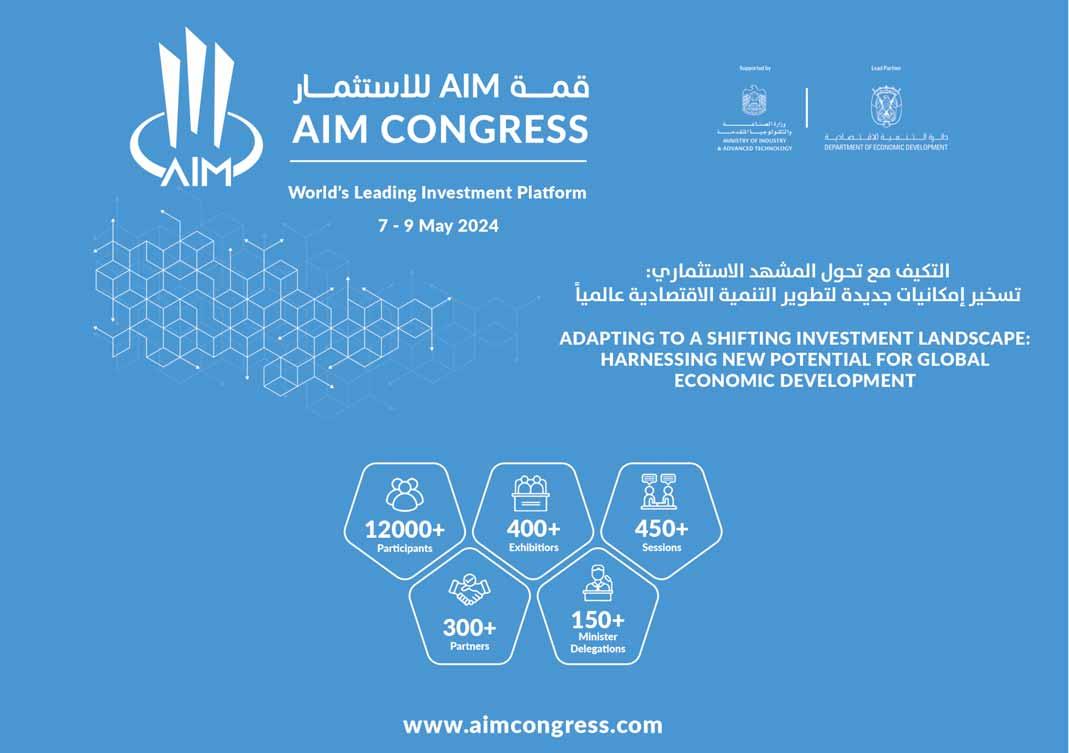
GEORGIA TODAY MAY 3 9, 2024 5 POLITICS
Image source: grass.org.ge
Defense Sector Review with Mercury Strategic: The Value of a Professional Reserve
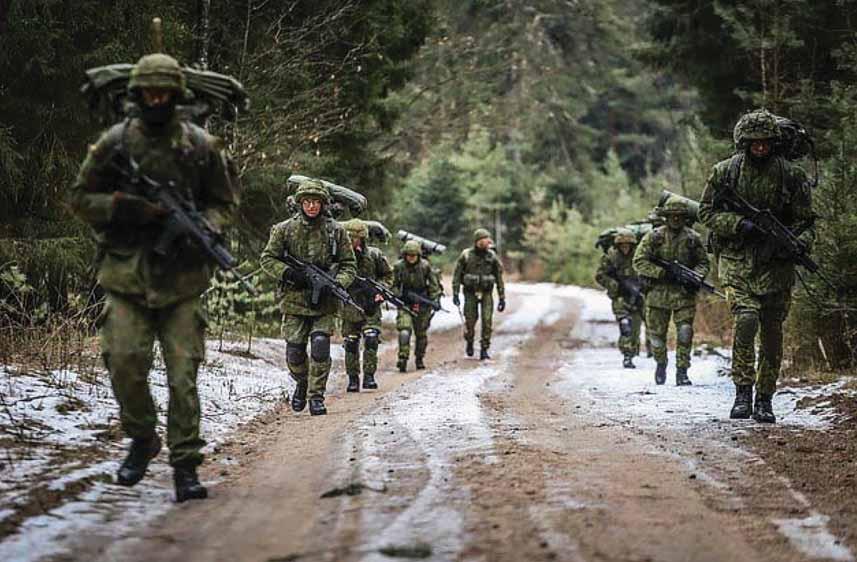
The idea that wars begin with professional armies and finish with citizen soldiers has been a recurrent international theme, with both Ukraine and Israel calling upon civilians to bolster the ranks of their regular forces. Some European countries, meanwhile, have publicly floated the idea that the reintroduction of conscription may be a necessity in the future.
In many countries, particularly those of the Eastern Bloc and former Soviet Union, the idea of ‘military reserves’ constitutes those citizens who have completed their period of mandatory service and returned to civilian life. Their names will be retained on a ‘reserve list’ from where they can be called upon at times of national need.
Ukraine, Israel, and Russia have all made use of this practice, but the idea of a ‘reserve’ being composed of former conscripts is not universal. Indeed, although conscription is arguably inevitable in cases of peer-on-peer conflict, civilians forced into uniform do not necessarily have to be the first line of reinforcement for regular forces.
Particularly in the Anglophone world, ‘reserve’ forces refer to part-time soldiers, civilians who commit to military training on weeknights and weekends. As volunteers, they are under no obligation to serve, but choose to do so in order to maintain their civilian employment and lifestyle while also undertaking a military career. Under this system, units composed entirely of part-time troops can contribute small numbers of soldiers to reinforce or supplement a Regular unit embarking on a deployment, or be activated as standalone formations in their own right.
Having entire battalions and regiments
(or even brigades and corps) made up of part-time soldiers can, therefore, give an army considerable strategic and tactical advantages; this is not solely due to the fact that part-time volunteers are motivated in a way that conscripts are not, but also because their roles and responsibilities are not limited to those of light or motorized infantry.
In most cases, those armies which consider an ‘army reserve’ to be a list of former conscripts will not expect their ‘reserve’ troops to undertake any duties beyond those of basic infantry. All too often, conscript forces are pressed into service on the frontlines, but professional volunteer reserve troops can be trained for any role in the armed forces: artillery gunners, vehicle mechanics, combat engineers, signals and communications specialists, and even special operations forces are all jobs that can be performed by soldiers who train on a part-time basis. Part-time troops can also bring in their expertise and experience from the civilian world for specialist roles.
With the rising threat from Russia, the following conundrum is facing a number of NATO countries:
• They do not have a sizeable standing army
• They have abolished conscription
• They do not make use (or extensive use) of professional part-time troops
A return to conscription does not necessarily, and arguably should not be, the answer. The generally poor performance of conscript forces has been documented in both World Wars, Vietnam, the Falklands (as used by the Argentine military), and in more recent conflicts in the former USSR.
In light of this, some of these nations have suggested a new form of national service, in which citizens will volunteer
to undergo a training program lasting at least three months before having their names put on an ‘Army Reserve’ list. This could be called ‘volunteer conscription.’ The proposed system, however, does not result in soldiers who are any better trained than conscript forces, and in fact actually robs conscription of its principle benefit - the sheer volume of troops it produces.
In fact, it could be stated that this suggestion of service falls between every conceivable stool. Asking volunteers to
serve full-time for a number of months in order to be placed on a Reserve list is unrealistic; anyone who can actually commit to full-time training is more likely to opt for service in the Regular army. The chance to recruit those who would wish to serve but are unable to do so on a full-time basis is entirely missed under this proposal.
Training professional part-time forces also has the added benefit of being costeffective. In order to teach part-time recruits, military bases are only obligated
to function for a few additional weeknights and weekends; in time, the training can be entirely carried out by other part-time Reserve troops, and so Regular forces will not be tasked with additional duties at all.
As stated, the bulk of those seeking to serve part-time will be people whose civilian career or family circumstances preclude Regular enlistment. Many soldiers of the US Army’s National Guard or the British Army Reserve are people who felt that the chance to join had passed them by, and that giving up civilian and family success to enlist in the Regular forces would be deeply unwise. Reserve service, therefore, offers them the opportunity to retain their civilian circumstances while fulfilling their desire to wear a uniform.
Others can be attracted by qualifications that can be earned through training and which have applications in the civilian world. This is already a major recruiting tool for the Regular forces, but can also be used by their Reserve counterparts.
Former soldiers, too, make up a portion of Reserve forces. In many cases, these veterans have moved on professionally, and therefore, like many civilians, are not in a position to re-enlist full-time. In fact, for many of these, it is not the military career itself that makes them nostalgic for service, but rather the military lifestyle. Their experience and prior training can be harnessed by allowing them to return on a part-time basis.
Whether part-time service is introduced to replace conscription or augment it, its undeniable benefits should render it a critical point of consideration for those countries aiming to improve the state of their national defense. While its introduction would take time, it would be relatively simple to implement - and prove itself decidedly cost-effective.
***
Defense Sector Review is an analysis of the regional and relevant security and defense issues by the team at Mercury Strategic Services, a defense consulting, training, and advisory company based in Tbilisi, Georgia and at www.mercstrat. com.

GEORGIA TODAY MAY 3 9, 2024 6 POLITICS
Conscripts in Lithuania conduct food patrol training during their 9-month mandatory service. Photo Credit: G. Maksimovicz-Alkema/Lithuanian Armed Forces
training using laser simulation devices. Photo Credit: Ministry of Defense of Armenia
Armenian troops conduct combat operations
Luis Navarro: Ivanishvili Wants to Have the EU Be the One to Walk Away from Georgia
INTERVIEW BY VAZHA TAVBERIDZE
Luis Navarro is the former director of the National Democratic Institute in Georgia (2009-2014) and is Eurasia Program Fellow at Foreign Policy Research Institute. He was also both presidential campaign manager and the last chief of staff for then-United States Senator Joe Biden (2007-2009). Radio Free Europe/RL’s Georgian Service sat down with him to talk about Georgia’s latest political drama.
TELL US YOUR THOUGHTS ON WHAT’S BEEN GOING ON. WHERE DO YOU SEE THIS HEADING?
Unfortunately, Georgia has a government which came into being in no small measure because of the excesses of its predecessor. But with the significant difference being that there were indications all along about what the oligarch’s true motives were from the very beginning. The first thing I would point to is his claim in 2012 that he had sold off his Russian base assets. He never provided any proof to back that up, nothing about that was transparent: Who did he sell to, for how much, when? Nothing. And it is remarkable to me how many people outside of the government took that at face value. Then, at least as early as a press conference he gave in April of 2013, he made it very clear that he was the one to be trusted with creating the only true opposition in Georgia: Having defeated the government, he would now create an opposition to the government, the point here being that this guy from the very beginning asserted that he would have complete control of the political landscape, even including the opposition. And then, the last point I would make is his targeting, his public questioning, of the legitimacy of the NDI and IRI, and generally both organizations’ polling. John Bass was great, but most of his successors, for whatever reasons, decided that placating the oligarch was more important. And so once Bass had departed, and Ivanishvilli realized noone would be standing up for us, he figured, “then clearly I can go after them, regardless of who funds them.” So his antagonism toward the political opposition, NGOs, and the lack of transparency around his ties to Russia, have been evident for all to see from the very beginning. At Monday’s rally, he chose to publicly double down, saying that somehow membership in the EU is for the Georgian government to decide, on their terms, and that their willingness to enter is predicated on them retaining every-
The reintroduction of this foreign agents’ law is a direct response to what he sees as Ukraine's diminishing fortunes in the West
thing there is about them. But that's not how joining a club works in any context. I think this re-introduction of the foreign agents’ law is directly connected to how Ivanishvili views the Western reaction to Ukraine; he sees anti-Ukrainian political forces ascendant and capable of delaying aid to Ukraine, in the United States as well as Europe. And so, he thinks, again, as with the NGOs, if the EU are not willing to stand up for their own goals, well, then clearly that leaves him room to determine them himself.
WHAT DOES HE EXPECT THEM TO DO?
I think he wants to have the EU be the one to walk away (from Georgia). Georgian Dream all but dared the EU not to grant candidate status; they were stunned when they received it. And now they are making it abundantly clear that they cannot do that, they are unwilling to pursue that path; they claim the price of candidate status is too high and requires Georgians to give up their sovereignty and Georgianness in order to be a part of Europe, and the answer to that is “well, then perhaps it’s preferable to be in Russia’s sphere of influence after all.”
WHAT IS THE GLOBAL WAR PARTY THE GEORGIAN DREAM AND IVANISHVILI HIMSELF REFER TO AS THE CAUSE OF ALL THEIR TROUBLES?
It is an extension of the very first narrative that brought Ivanishvili to office, which is that Misha propagated a war that ended in Georgia's diminishment.
His narrative is that this is the West's fault, both 2008 and the war in Ukraine. As I said earlier, the reintroduction of this foreign agents’ law is a direct response to what he sees as Ukraine's diminishing fortunes in the West. So, if the West is not going to step up, and do everything on behalf of Ukraine, then, clearly, he can do what he wishes in Georgia. And even though he never explicitly says we should be aligned with Russia, his rationale always comes down to, “we should never do anything that would displease Russia.”
YOU MENTIONED HIM TARGETING THE NDI, THE ORGANIZATION YOU WERE A HEAD OF. WHAT WAS THE BEEF ABOUT THERE?
Well, I don't think it was personal, because I had a number of private engagements with him in the presence of other people from my organization, and in those meetings, he could not have been more courteous, I don't want to say friendly, but, you know, hospitable. This happened only in the public narrative, and the framing of it was essentially the same as his framing of NGOs: “This is a USfunded entity that is supporting my political opponents, Misha and the United National Movement.” And his entire basis in this was simply that we didn’t produce results that aligned with his views or the way he wanted us to do things. His belief was that “if somebody is criticizing me and mine, then they're wrong. They must be wrong.”
GEORGIAN DREAM HAS PROVIDED A DETAILED DESCRIPTION OF WHO THEY CONSIDER AS ENEMIES OF THE PEOPLE AND COUNTRY. BY THAT DESCRIPTION, YOU QUALIFY AS ONE. WHAT WOULD YOUR RETORT BE TO THAT ACCUSATION?
All I can say is that if all that is required to be an enemy of the state is to not be aligned with supporting Ivanishvili, his aims and objectives, then what more can be said? As with so many other authoritarians, the goal is to polarize. “Everybody who's not with us is against us, full stop.” You see that with Trump, you see that with LePen, with Modi, with Orban. You saw that with the Law and Justice Party in Poland, the only anti-Russian force among all of them. It’s the “us against the world” attitude. “And only if you are exactly like us, and only if you agree with 100% of what we say, then
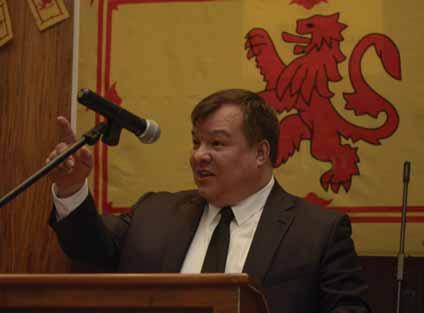
you're legitimate, otherwise you are a foreign agent, receiving foreign aid.” And the remarkable thing about this is the amount of tangible economic support Georgia receives from the West, including the military structures. And then you see this ridiculous narrative, which says, “oh, well, if they give us money, it's okay. We know we can trust ourselves.” It's absurd.
DURING YOUR TENURE AS THE NDI HEAD, YOU WITNESSED THE WORST YEARS OF THE FORMER GOVERNMENT AND THEN THE COMING OF THIS ONE. HOW DO THEY FARE IN COMPARISON, IN TERMS OF REPRESSION, AUTHORITARIAN RULE, AND SO ON?
Well, whatever the excesses of the previous government, including to whatever extent they bear responsibility for making this government possible, there is a qualitative difference, I think. There have been authoritarian minded politicians in the West, whether it's the Law and Justice Party in Poland, or Trump in the United States, but they are simply not comparable in the scope of their reach into society to that of Putin in Russia. And the latter seems to be the desired model for this government. It's not like when they disagree with something, they will try to tip the scales against you in a system that they present as even handed. That is not their modus operandi: Their modus operandi is, “we will make you pay for not agreeing with what we are saying, and it will be brutal and it will be unremitting.”
That is the qualitative difference. GIVE US A SHORT PROGNOSIS ON THE COMING ELECTIONS, THANKLESS AS THAT TASK MIGHT BE. WHAT CAN WE EXPECT?
Regardless of what the political operatives may believe, all of the money and organization you have matters, but, typically, it only matters at the margins. The narrower the victory, the more those elements can be attributed to the outcome. At the end of the day, elections are decided based on the mood and motivation of the people. And there simply isn't enough money. There's never enough money to persuade all the people. So if the population’s response to the actions of the government and the apparent intent of this government to walk away from Europe, Western integration (as reflected by those in the streets tonight), then I would argue that this government is in big trouble, and there will be no way for this government to retain power outside of direct, broad malfeasance. However, if there is not sufficient effort by all concerned, the West, opposition, NGOs, media, to engage in a nationwide, grassroots effort to educate the people why it matters for them, then Bidzina’s millions, Georgian Dream’s administrative resources, and the Kremlin interference, will carry the day for them.
He thinks membership in the EU is for the Georgian gov't to decide, on their terms
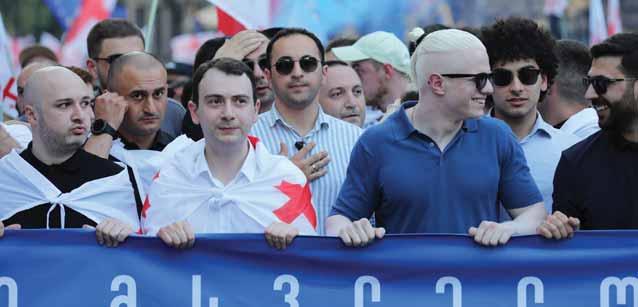
If there is no sufficient effort by the West, opposition, NGOs, media, to educate the people why it matters for them, Bidzina’s millions and the Kremlin will carry the day
GEORGIA TODAY MAY 3 9, 2024 7 POLITICS
Luis Navarro. Source: FB
Pro-Georgian Dream supporters, with Ivanishvili's son Bera, at the march on April 29th
From Idea to Impact: The Journey of Connect and Healzcare.org
INTERVIEW BY MARIAM MTIVLISHVILI
Connect is a startup focusing on digital tools for the medical market, notably ‘healzcare.org,’ which streamlines medical tourism services through a single marketplace, addressing challenges such as connecting international patients with Georgian clinics and ensuring transparency in financial transactions. The startup aims to mitigate issues like shadow accounting and bureaucratic hurdles by providing a comprehensive platform that integrates medical services and logistical support. Accessible through healzcare.org, the startup plans to launch in the summer, with future goals including refining the product, securing investments, and participating in the Hult Prize 2024 competition, aligning itself with the UN Sustainable Development Goals.
To find out more, GEORGIA TODAY talked to Levan Tchanukvadze, CEO and co-founder of healzcare.org.
“Our startup ‘Connect’ is focused on creating new, digital tools and platforms for the medical market,” he says. “Today, our main project is ‘healzcare.org,’ which makes it easier to get medical tourism services, by creating a single marketplace. At healzcare.org, international patients have the opportunity to search for the medical services they want across borders, in different countries, and with the help of our artificial intelligence, generate a complete package that includes both the logistical and financial parts.”
TELL US ABOUT THE GENERAL CHALLENGES FACED BY HEALTHCARE SERVICES IN THE GEORGIAN MARKET.
In general, in Georgia, as well as worldwide, medical tourism is a new direction, which developed and increased in demand especially since the Covid pandemic. In

our country, we have a number of highlevel medical organizations that can compete in specific fields with any premier foreign clinic, however, the issue is connecting foreign patients and these Georgian medical organizations: There is no common platform where both sides can find each other. Also, even more alarming is the situation that often happens to foreign patients on the part of Georgian organizations, called "shadow accounting", when individual doctors of an organization dishonestly use the trust of foreign patients and arbitrarily add various fees.
The fact that it is quite difficult to organize all the services associated with medical tourism, including legal and
Participants Gather for 57th ADB Annual Meeting

Source of image: adb.org
Participants are gathering in Tbilisi, Georgia for the Asian Development Bank’s (ADB) 57th Annual Meeting, which opens tomorrow and will examine key development issues facing Asia and the Pacific including climate change, artificial intelligence, and green globalization.
This is the first time Georgia is hosting an Annual Meeting of ADB’s Board of Governors. The meeting, which runs from 2 to 5 May under the theme “Bridge to the Future”, brings together finance ministers, central bank governors, senior government officials, and representatives from the private sector, academia, media, and civil society from ADB’s 68 members.
“The meeting will showcase the growing partnership between Georgia and ADB and emphasize Georgia’s commitment to regional development and coop-
eration,” said ADB Managing Director General Woochong Um. “Tbilisi’s location at a crossroads between east and west presents an excellent opportunity to explore the physical, financial, and economic connections between Asia and Europe.”
Georgia joined ADB in 2007. ADB has committed more than $4 billion to Georgia, becoming one of the country’s largest multilateral development partners. Read the full schedule of events here. Follow ADB Annual Meeting news and updates on ADB’s website and social media channels—LinkedIn, X, Facebook, and Instagram.
ADB is committed to achieving a prosperous, inclusive, resilient, and sustainable Asia and the Pacific, while sustaining its efforts to eradicate extreme poverty. Established in 1966, it is owned by 68 members—49 from the region.

bureaucratic assistance, etc., is also very important.
HOW DOES YOUR STARTUP SEEK TO OVERCOME THESE CHALLENGES?
To solve these challenges, we create a common marketplace where we connect international patients with clinics in different countries and provide all additional services. We already have both medical and other field organizations as partners, and we combine all services in one package with only one payment, which also ensures financial transparency and reliability.
WHEN WILL ACCESS TO YOUR

SERVICES BE AVAILABLE?
Our service will be available in early summer at healzcare.org, where both patients and organizations can sign up. For companies, that is, for our partners, there is an additional platform, a module, where numerous advanced digital tools are available, which makes it easier for them to manage operations and patient data.
TELL US ABOUT YOUR FUTURE PLANS.
Our future plans are primarily for the market launch, which we plan to do in the summer. At the same time, we are working on attracting investment to further refine our product, start marketing
activities, and bring the product to its final form.
In the summer, we will participate in the Hult Prize 2024 global competition, where a Georgian startup in our form was selected for the very first time. To reach this stage, we had to overcome quite a few barriers and in doing so achieved many victories!
This competition includes, in addition to the competition itself, an acceleration program. The project is intended for startups founded by students and is organized by the United Nations together with the Hult Foundation. To participate in it, the startup must be related to one of the Sustainable Development Goals of the United Nations, which we very proudly are!
Developing Asia and the Pacific Unprepared for Challenges of Aging Population
Developing Asia and the Pacific is unprepared to secure the well-being of its rapidly aging population as the growing share of older people in the region face challenges from low pension coverage to health problems, social isolation, and limited access to essential services.
While longer lifespans reflect the region’s development success, comprehensive policy reforms are urgently needed to support the welfare of older people, according to Aging Well in Asia: Asian Development Policy Report, released today by the Asian Development Bank (ADB) at its 57th Annual Meeting.
The number of people aged 60 and older in developing Asia and the Pacific is set to nearly double by 2050 to 1.2 billion—or about a quarter of the total population—significantly increasing the need for pension and welfare programs as well as health care services. At the same time, economies have an opportunity to reap a “silver dividend” in the form of additional productivity from older people, which could boost gross domestic product in the region by 0.9% on average.
“Asia and the Pacific’s rapid development is a success story, but it’s also fueling a huge demographic shift, and the pressure is rising,” said ADB Chief Economist Albert Park. “Governments need to prepare now if they’re going to be able to help hundreds of millions of people in


Source of image: www.adb.org
the region age well. Policies should support lifetime investment in health, education, skills, and financial preparedness for retirement. Family and social ties are also important to foster healthy and productive populations of older people and maximize their contribution to society.”
According to the report, 40% of people over age 60 in Asia and the Pacific lack access to any form of pension—with women disproportionately affected, as they are more likely to do unpaid domestic work. As a result, many older people in the region have no choice but to work well beyond retirement age to survive. Among those still working at age 65 or older, 94% work in the informal sector, which typically doesn’t provide basic labor protections or pension benefits. Physical and mental health challenges also increase with age. Around 60% of older people in Asia and the Pacific do not attend or receive regular health checks, while 31% report depressive symptoms owing to illness, social isolation, and economic insecurity. Older women in the region are also more likely
than older men to suffer from ill health, from depression to diabetes and hypertension.
The report recommends a wide range of policy measures to support healthy and economically secure aging. Among these are government-assisted health insurance and pension plans, improved health infrastructure, and free annual check-ups and lifestyle evaluations. Policy makers should aim for universal health care coverage, while basic labor protections should be extended to older informal workers, according to the report. By making mandatory retirement ages more flexible, helping older people stay healthy, and providing them with suitable work opportunities as well as lifelong learning and skills development, economies in the region can help older people stay productive longer.
ADB is committed to achieving a prosperous, inclusive, resilient, and sustainable Asia and the Pacific, while sustaining its efforts to eradicate extreme poverty. Established in 1966, it is owned by 68 members—49 from the region.
GEORGIA TODAY MAY 3 9, 2024 8 BUSINESS
Levan Tchanukvadze - CEOShako Bitsadze - COOAnastasia Tsertsvadze - Head of Marketing and Communications
Energy Efficiency – What It Is and Why You Should Be Doing It
BY KATIE RUTH DAVIES
As energy prices soar and the public becomes increasingly aware of the environmental risks associated with the burning of fossil fuels, home and office energy efficiency is hitting the top of people’s priority lists. And if it isn’t, it should be! As a property owner myself, looking with newly opened eyes at her (definitely energy in-efficient!) home, I realize it is beyond time to join those globally who are now actively upgrading their buildings to be more energy-efficient – in the long-term saving both money and (hopefully!) our planet.
Energy efficient buildings not only provide comfortable living and working environments, but also cut down on energy expenditure, making better use of our planet’s resources. When done right, they also contribute to cleaner indoor air quality by employing cleaner combustion methods and offering better ventilation than traditional structures – meaning they are healthier! In short, when you prioritize energy efficiency in construction or renovation, you are choosing a smart, cost-effective strategy for combating climate change and safeguarding user health.
WHAT DOES “ENERGY
EFFICIENCY OF BUILDINGS” MEAN?
Energy efficiency is all about using less energy to achieve the same task or goal. Energy-efficient buildings demand less energy for heating, cooling, and powering various devices, while in a factory, for example, it means running systems and equipment that use less energy in the manufacturing process.
Setting yourself the goal of making your home and office more energy efficient is a simple and cost-effective approach to tackling climate change, reducing your energy costs and boosting business competitiveness. Moreover, energy efficiency is pivotal to achieving global net-zero carbon dioxide emissions, as picking this path supports important global decarbonization initiatives – contributing to a much bigger mission than just your own health and savings!
WHY ARE MOST OF OUR CURRENT BUILDINGS “ENERGY INEFFICIENT”?
Centuries ago, constructing buildings with energy efficiency in mind was a priority, even if the concept didn’t yet have a name. But as fuel for heating became increasingly available and ever more affordable, attention shifted towards features like bigger windows offering panoramic views, interconnected spacious rooms, lofty ceilings, and, to heat it all, oversized boilers toiling away inefficiently in basements. Further, with the widespread adoption of air conditioning, considerations for what we now term 'sustainability' were largely thrown out of those expansive windows.
Next time you’re walking around Tbilisi, or taking a drive past those beautiful 19th and early 20th century villages in Georgia’s regions, pay attention to the houses there. You’ll see porches, balconies, wide roof overhangs and trees giving summer shade; rooftop skylights, which maximize natural sunlight and encourage ventilation; and thick masonry walls made from stone or brick to retain heat in winter and keep the rooms cool in summer. On closer inspection of these old buildings, you might also see traditional exterior shutters and interior Venetian blinds on the windows, making them more energy-efficient than modern windows, or the remains of light-colored paint on exterior walls, chosen specifically to reflect the hot summer sun,

resulting in cooler interior living spaces.
Look at the position of the windows in these old buildings too: Where possible, they were only installed where they could effectively allow for lighting and ventilation. Modern architecture, by contrast, relies on more windows than are necessary as a stylistic measure.
WHY SHOULD WE MAKE OUR BUILDINGS ENERGY EFFICIENT?
To save money, to improve comfort and health, and to reduce our consumption of valuable resources. Yes, it can be an expensive investment, but you shouldn’t focus solely on the upfront expenses, as these can be discouraging; instead, evaluate the full lifetime costs to find that all-important break-even point that shows you are doing the right thing for you, your employees, your family and the planet.
AN IMPORTANT NOTE
Prior to kicking off any construction or renovation project, it's crucial to take into account both the carbon footprint of your chosen materials and the operational carbon emissions stemming from elements such as heating systems: You need to think about not only the quantity of energy you’re going to be using, but also its source. There are plenty of sites and tools online to help you and your architect plan right. Have a look here as a starting point: circularecology.com/carbon-footprint-calculators-for-construction
HOW TO MAKE A BUILDING ENERGY EFFICIENT (NEW BUILDINGS)
This section of my article is aimed at those lucky people designing a new home or office, but it is also well worth your reading time even if you’re already insitu in an older building. Read on! If you’re aiming for a cost-effective, zero net energy building project and are starting from scratch, you are at a distinct advantage. We advise you start by first estimating the building's energy consumption using that energy modeling software we mentioned above. After that, you can take your pick from the tips below, or, better yet, go all-in for top energy efficiency.
1) Use the Sun for “Solar Tempering” - Leveraging sunlight for heating via south-facing windows during the winter reduces heating expenses, while shading these windows during the summer months cuts down on your cooling costs. You can also use the sun for renewable energy, as solar panels can power all the energy needs of a home or office, including lighting, heating and cooling systems, appliances and hot water. Be ready to make space for the necessary equipment, though!
2) Super-Seal the Building Envelope - Super-sealing the exterior of the building (its “envelope”) is the single most cost-effective measure you can take to improve the energy efficiency of your ultimate zero energy home or office.

This job will require careful assessment and a lot of caulk and foam! On doing my research, I was surprised how many “leaks” my house had: Windows and door frames were the obvious points, but also sockets and switches, anywhere plumbing or wiring comes through from one room or floor to another; even the joints of walls! Next, after making your building airtight, super insulating is probably the second most cost-effective strategy to aim for – using foam panels and thick attic insulation.
3) Create an Energy Efficient, Fresh Air Supply – Even though we just emphasized the importance of plugging the leaks in your home, a continuous source of fresh filtered air and moisture control are critical. Highly energy efficient ventilation systems (called Heat Recovery Ventilation, HRV) systems, or energy recovery ventilation (ERV) systems, expel stale air while recovering heat and returning that same heat to the home or office with the fresh air. Such a system is a hefty financial investment to make, but one that is highly beneficial for user health- and it will definitely pay back in the long-term.
4) Select an Energy Efficient Heating System – Choosing a modern heating system will boost the energy efficiency of your new-build. Heat pumps are the most energy efficient heating systems around, while gas furnaces are the cheapest and most commonly used. Their efficiency in heating is rated with HSPF (heat pump) or AFUE (furnace). The higher the rating, the more efficient it is. A geothermal heat pump is the best option, and if you can afford the installation cost, they say it can cut your heating bills by up to 70%!
5) Install Energy Efficient Lighting –We’ve all heard that LED bulbs are the way to go today- being safer, longerlasting and ultimately easier on the pocket when it comes to your bills, but where you put those bulbs is also an important factor to think about while planning your new home or office. Locating lights strategically, and using natural light as effectively as possible, can drastically reduce a home or office’s energy use.
6) Select Energy Efficient Appliances and Electronics – When you’re shopping for your refrigerator, microwave or dishwasher, pay attention to the energy rating (those rainbow stripes that show you if the appliance is “A” “B” “C” or lower). This “energy performance certificate” is nothing to do with how well the machine functions, but how much (or ideally little) energy it needs to do its job. Green (A,B,C) class appliances may cost more at the outset, but they will ultimately be better for your energy bills and the planet by using less electricity!
HOW TO MAKE A BUILDING ENERGY EFFICIENT
(EXISTING BUILDINGS)
If, like me, you made some uneducated,
cost-cutting choices in your build, or are living or working in an older and less energy efficient structure, fear not- you can still turn things around!
When we talk about making an older building energy efficient, if money is no object, most, if not all of the above six steps can be applied. Those on a budget, however, should start with the envelope by sealing the windows, walls, door openings, etc., as mentioned above. With windows, think “repair, preserve and seal” if you can, rather than diving into the expense of replacing outright.
Insulate the exterior walls, though be aware that stone is porous. This means it needs to breathe to keep the interior air healthy and to prevent damp. You can insulate from the inside, but we suggest you get some professional advice first, to make sure you don’t end up trapping damp in your walls. If nothing else, lay down some thick-as-you-can-afford insulation in the attic, as the cost of insulating the roof is usually lower than the cost of solid wall insulation. Typically, about 25% heat is lost through the roof, in comparison to 35% through the walls, 15% through the floor and 25% from windows and draughts.
The US Energy Information Administration says that heating and cooling your home typically makes up about 51% of your utility bill, so it is worth investing in a system that saves and which will also enhance your property value. As such, once your envelope is set, you should take a look at your heating system. If you have a pump, consider installing programmable thermostats to control when the radiators are on. And if you decide you need a new heating system, but the cost is deterring you, remember: While it's a significant investment, the benefits are substantial and you may well find flexible payment options out there! Definitely avoid sizing and purchasing a heating system independently, though. It's crucial to collaborate with a reputable HVAC contractor or home performance professional so no mistakes are made or money is wasted.
ON A REALLY TIGHT BUDGET? If the bigger steps above are financially beyond you, you can start on your energy efficiency path by taking simple steps that make a good impact on your bills and comfort but which don’t change the building fabric itself. Turn your thermostat down a degree in winter, not enough to put a chill in your bones, but energy-impacting nonetheless; fix the caulking/weather-strips in your windows and doors- this and a thick pair of curtains can be just as effective as more expensive measures; use floor coverings or rugs to block air infiltration and keep your feet warm; replace your bulbs with LEDs where possible; and plant a shade tree outside – ideally a deciduous tree which loses its leaves in winter and allows sunlight to hit the building, and which provides shade in the summer to keep the building cooler. The tree should be put at a safe distance from the house to avoid damage to the foundation and falling limbs during a windstorm!
Remember that where energy efficiency is concerned, every little helps, but the bigger the better – for your health, your pocket, and for the good of the planet! In a future issue of GT, I’ll be zooming in locally and looking at Energy Efficient Buildings in Georgia – Where We Stand and What to Expect. Be sure to stay tuned.
*** This article was inspired by the EU-funded Georgia Energy Sector Reform Program (GESRP)’s three-day media mentoring program ‘Covering Energy Efficiency and Renewable Energy Issues in Georgia’ on April 19-21, 2024, at the Tsinandali Estate, Radisson Collection Hotel.
GEORGIA TODAY MAY 3 9, 2024 9 SOCIETY
Ij Lijk Bilks and Dijks
BLOG BY TONY HANMER
Pseudo-Dutch… We’re near the end of our second week in the Netherlands, having a wonderful experience here and there despite the noticeable lack of that third dimension in the landscape, height. The country makes up for this in innumerable ways. At the same time, we feel a mix of emotions as we follow news from Georgia, roiling once again in its furious protests and counter-protests and police response. The whole world is watching once again. Our hosts, my old friends from years before Georgia, took us to Texel Island in the north for a weekend, which also turned out to include King’s Day, the monarch’s birthday and a blazing orange national festivity. The weather was still quite cold, but short rains did nothing to quench our enthusiasm as we settled
into our apartment and began exploring the island.
Texel famously includes a beautiful memorial garden to 481 Georgian soldiers who right at the end of World War II turned against the Nazi German occupiers and all died fighting them. Our friends had not known this until I discovered it while researching the place before we left Georgia, so it was a nice find for them as well as us. A rose bush has been planted for each of the soldiers, and all their names are listed on a large plaque, in both Georgian and Latin alphabets.
The island has a sanctuary for injured or orphaned seals as well, taken in for a few months on average for care before being released back into the wild. We marveled at their superb, gliding mastery of water compared to how they struggle to move on land. A number of species are here at any time.
The lighthouse with its climbable tower gave us a good look at most of Texel, as
did the spire of the largest church. And we enjoyed some great local food, while the whole place partied, letting its hair down to celebrate King’s Day. But there has been so much more to see in addition to this. Keukenhof Park is justifiably billed as the world’s most beautiful spring garden, with hectares of tulips in an unending variety of colors offering two months of glory to up to 20000 visitors per day. Forests and ponds with water birds add to the magic. Despite so many people, crowd control and bus transport are well handled, and it never felt claustrophobic. Lali was thrilled at every step, and I took over 300 photos.
We spent a few hours wandering through Amsterdam’s huge Rijksmuseum, the state art museum, home to Rembrandt’s huge Night Watch, more paintings by him, many canvases by Renaissance-era Impressionist precursor Frans Hals, and hall after hall of art from millennia BC to the present. Too much to take in, but we loved it. Today, it’s the Escher Museum,

CULTURE
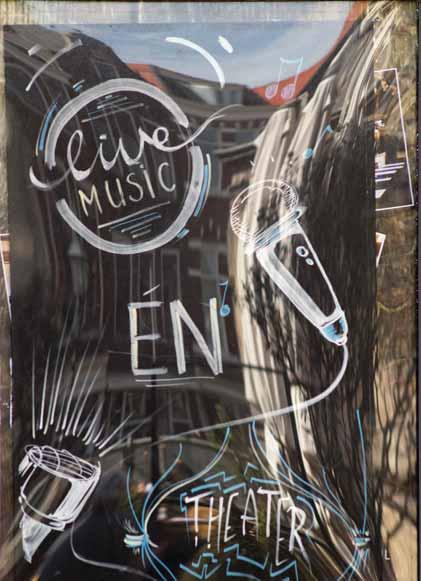
for my favorite graphic artist in the world, in The Hague.
A Georgian friend of many years showed us around Delft as well. I knew this to be one of the most important cities in the world for pottery since the Middle Ages, especially blue-and-whiteware.
But the whole city is visually marvelous with its canals and high, narrow old houses and squares; its porcelain history is only a small part of visiting.
We are very impressed with the public transport in this country: Quick, multimode, frequent, not crowded or noisy.
But it is expensive compared to Georgia, of course, matching the Netherlands’ high standard of living. The country is also becoming increasingly cashless,
with more and more places accepting only cards for payment.
Now, with two days left, we look forward to going back east, but again with some trepidation from the unrest which is currently defining Georgia. However, it remains home.
Tony Hanmer has lived in Georgia since 1999, in Svaneti since 2007, and been a weekly writer and photographer for GT since early 2011. He runs the “Svaneti Renaissance” Facebook group, now with over 2000 members, at www.facebook.com/ groups/SvanetiRenaissance/ He and his wife also run their own guest house in Etseri: www.facebook.com/hanmer.house.svaneti
Gallery Fotoatelier: Bringing Georgian Photography to the Global Stage at the Dubai Art Fair

Gallery Fotoatelier is set to make its mark at the prestigious Dubai Art Fair this May, joining over 300 galleries worldwide in a celebration of artistic diversity and innovation.
As a platform dedicated to promoting emerging and established photographers, Fotoatelier's participation underscores its commitment to fostering international dialogue and showcasing talent on a global scale.
CEO Tornike Apridonidze notes: "The Dubai Art Fair provides an unparalleled opportunity for us to connect with a diverse audience and highlight the exceptional talent represented by our artists."
Visitors to Gallery Fotoatelier's booth can expect a curated selection of capti-
vating photographic works exploring various themes, styles, and techniques. From breathtaking landscapes to thoughtprovoking conceptual pieces, each photograph invites viewers to engage with the artist's vision. Participating artists: Nino Alavidze, KetoMa, Giorgi Lomidze, Giorgi Shengelia.
This marks Gallery Fotoatelier's second participation in a major art fair, following a successful debut at the Tbilisi Art Fair.
Established in 2020, Fotoatelier aims to bridge the gap between Georgian and international photographers while encouraging multidisciplinary development and narrative research in photography.
Beyond showcasing works, Fotoatelier fosters a research-oriented approach, encouraging artists to push the boundaries of traditional representation and create meaningful narratives relevant to contemporary society. Through its participation in events like the Dubai Art Fair, Fotoatelier reaffirms its dedication to fostering creativity, promoting cultural exchange, and enriching the global artistic landscape.


GEORGIA TODAY MAY 3 9, 2024 10 SOCIETY
 BY SHELBI R. ANKIEWICZ
BY SHELBI R. ANKIEWICZ
American Friends of Georgia (AFG), a non-governmental organization (NGO), is to celebrate 30 years of charity work and friendship with sponsors and partners through their annual gala on May 18.
The organization was established in 1994 by an American lawyer with Georgian roots, Constantine (Connie) Sidamon-Eristoff, to help children and elderly people throughout Georgia. The Executive Director of AFG, Lena Kiladze, has held her title since the Georgian office opened in 2006. She says the gala is held once a year and is their biggest charity event to promote social giving and engagement in society.
“It is always unique, because it unites people, and this time we have a wonderful group of people, our long-time partners, and supporters,” says Kiladze. “It’s
basically an evening of friendship.”
She notes the proceeds from the event will go toward supporting two focus projects, the first one being the Dzegvi Shelter outside of Tbilisi. What first started as an orphanage in 1995, is now a community that has housed more than 100 street children, single mothers, elderly people, and those with disabilities. Kiladze says AFG wants to restore this community by adding greenhouses, reconstructing buildings, and encouraging social and business activities for the residents.
The second focus project is Hospice and Palliative Home Care Projects.
Kiladze tells us this is the first hospice program in Georgia that offers a free nursing school and home care program.
She says it helps more than 100 elderly people with palliative home care by providing them with medicine and attention that’s needed during the last stage of their lives.
In addition to the proceeds from tickets at the gala, there will also be an auction, to which prominent Georgian art-
American Friends of Georgia Celebrates 30 Years of Charity Work and Friendship with Annual Gala
ists have donated their works. Those attending the event can expect a dinner, reception, and live music from the worldfamous jazz trumpeter, Chris Botti. Kiladze notes they are very excited to have Botti, who will be visiting Georgia to exclusively play at their charity event.
“It’s the 20th anniversary since the first time he came to Georgia,” Kiladze tells GEORGIA TODAY. “He is very happy to be back here, so it’s kind of like his friendship with Georgia, AFG, and our board members combined.”
In the 30 years that AFG has been around, they have supported more than 70 projects across the country. Kiladze says their work can be put into different categories: They support former street children, those with disabilities, children with tuberculosis or leukemia, promote children's inclusion, and more. In the beginning, she says, the focus was street children because the numbers were high in the 1990s.
Then, several projects were made over the years with those who have disabilities. Eventually, and still today, the focus shifted to helping children who had been diagnosed with tuberculosis and leukemia because, according to Kiladze, there wasn’t a cure for it at the time. AFG created the first and only Parents House in Tbilisi that gave a place for children to stay while they underwent chemotherapy treatment. Kiladze says this was the only hospital that treated children with the illness.
“Disability was a big problem, and still is, because there’s a certain stigma in Georgia, especially in the villages,” she says. “Sometimes, people had no idea that a family had a child with a disability because it was a shame to mention it, so we did a lot of work dealing with those issues.”
AFG also assisted in helping internally displaced people from the Russo-Georgian War in 2008. Kiladze says they built an Art Education and Rehabilitation Center in 2010 with the Embassy of Japan that helped over 115 children a year who had been traumatized by the war. The kids lived near Nikozi, which is next to South Ossetia, where Russia left bombs.
According to a report from AFG, 1,050 children have benefited from this project since 2010. Additionally, there was a War Relief Fund created by AFG in 2008 which helped over 1,700 internally displaced people from South Ossetia.
Another area Kiladze says the organization heavily focuses on is education. They assist in giving stipend funds and computers to children in remote villages, so they have the chance to study. They also aim to teach youth about cultural preservation and support Georgian craft production in remote villages.
“We think what’s most crucial for Georgia is a change in the level of education. That’s why most of our projects are related to this topic,” Kiladze explains.
Kiladze first got involved with AFG
because of her life in the 90s. She says she worked as an architect, but it was hard not to pay attention to the societal needs around her. She explains how she felt a social responsibility at the time to do whatever she could to help people.
She had friends and knew people who had begun working with children, so she slowly got involved with programs and started raising money. She explains how the people she was helping were also helping her by letting her create something wonderful with them.
“You can’t live in a bubble and pretend nothing is happening. There are people around you who enrich your life,” she says. “I don’t know who does more; maybe they do more for me than I do for them.”
Kiladze expresses how grateful she is to have relationships with people around the globe who want to help and support those in Georgia. She says it’s amazing how there are people who have never visited her country before, yet they are still willing to contribute. Kiladze says this is why friendships and relationships between people are everything.
“We never tried to advertise very much what we are doing, but it’s amazing after 30 years to be able to mention so many wonderful people, so many wonderful Americans, Georgian Americans, and Georgians, who have been very quietly supporting the cause and these vulnerable groups,” she notes.
Bakuriani 2024 Archery Championship:
Empowering Communities Through Sport
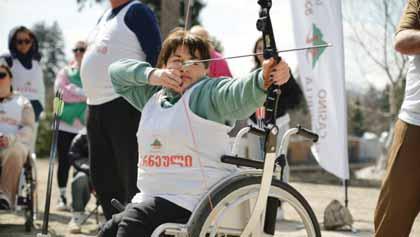
The spirit of athleticism and inclusivity converged in Bakuriani township for the 2024 Archery Championship among couples. Supported by Shangri La Tbilisi, this event brought together individuals from diverse backgrounds, including people with disabilities, war veterans, soldiers wounded in peacekeeping missions, and breast cancer survivors from various regions of Georgia. Over three days, participants engaged in a thrilling competition, marking a significant milestone for inclusivity in sports.
Organized in collaboration with the National Archery Federation of Georgia,
this championship marked its second year, receiving resounding acclaim from both participants and the communities of disabled and war veterans. Twelve pairs, each consisting of one woman and one man, showcased their skills in a display of determination and camaraderie.
The competition commenced with training sessions conducted by the National Archery Federation's coach, ensuring that participants were wellprepared for the challenges ahead. As the tournament unfolded, the atmosphere brimmed with excitement, with the competition progressing through several stages.
Ultimately, three pairs emerged victo-
PUBLISHER & GM
George Sharashidze
COMMERCIAL
DEPARTMENT
Commercial Director: Iva Merabishvili
Marketing Manager: Natalia Chikvaidze
EDITORIAL DEPARTMENT:
Editor-In-Chief: Katie Ruth Davies
rious, showcasing exceptional talent and resilience. Nino Sabashvili from Kareli and Gela Kheladze from Vani, a peacekeeping mission wounded veteran, clinched the first-place honors, earning the coveted transitional trophy. Nino Janashia from Kutaisi and Gocha Kochalidze from Marneuli, a person with a disability, secured the second-place position, while Nino Abaishvili from Khashuri and war veteran Guga Chimakhidze from
Kaspi claimed the third-place title.
Beyond the thrill of competition, the championship served as a platform for empowerment and integration. Participants expressed gratitude to the project sponsor, Shangri La, for fostering motivation, promoting individual abilities, and facilitating full societal integration.
This initiative aligns with the principles outlined in Article 30 of the 2006 UN Convention, which advocates for equal
participation in cultural, recreational, and sporting activities.
The Bakuriani 2024 Archery Championship stands as a testament to the transformative power of sport in fostering inclusivity, resilience, and community engagement. As participants continue to inspire through their achievements, this event serves as a beacon of hope for building a more inclusive and equitable society.
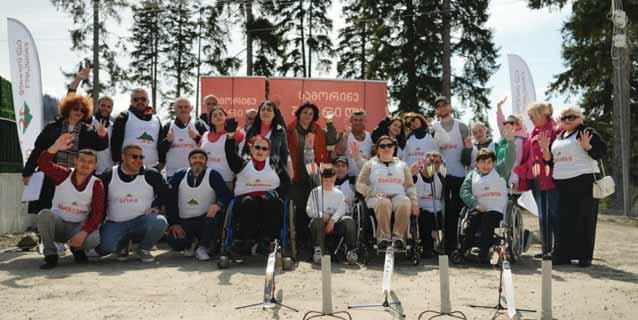
Journalists: Ana Dumbadze, Vazha Tavberidze, Tony Hanmer, Nugzar B. Ruhadze, Mariam Mtivlishvili, Erekle Poladishvili, Shelbi R. Ankiewicz
Photographer: Aleksei Serov
Website Editor: Katie Ruth Davies
Layout: Misha Mchedlishvili
Webmaster: Sergey Gevenov
Circulation Managers: David Kerdikashvili, David Djandjgava
ADDRESS
1 Melikishvili Str.
Tbilisi, 0179, Georgia
Tel.: +995 32 229 59 19
E: info@georgiatoday.ge F: GeorgiaToday
ADVERTISING & SUBSCRIPTION
+995 555 00 14 46
E-mail: marketing@georgiatoday.ge
Reproducing material, photos and advertisements without prior editorial permission is strictly forbidden. The author is responsible for all material. Rights of authors are preserved. The newspaper is registered in Mtatsminda district court.
GEORGIA TODAY MAY 3 9, 2024 11 CULTURE GEORGIA TODAY
Reg. # 06/4-309 SPORTS
Children who have been assisted by American Friends of Georgia.
Photo from Lena Kiladze




























 BY SHELBI R. ANKIEWICZ
BY SHELBI R. ANKIEWICZ


